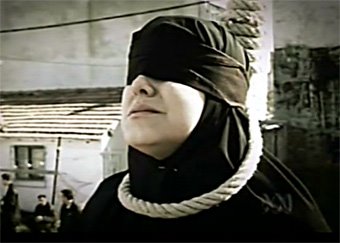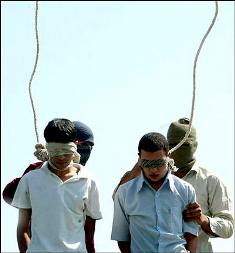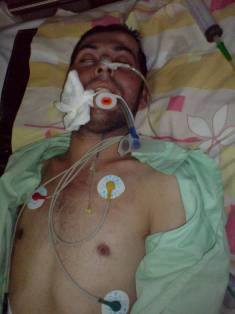By Roxana Saberi
Saturday, August 28, 2010
For several weeks last year, I shared a cell in Tehran's notorious Evin prison with Mahvash Sabet and Fariba Kamalabadi, two leaders of Iran's minority Bahai faith. I came to see them as my sisters, women whose only crimes were to peacefully practice their religion and resist pressure from their captors to compromise their principles. For this, apparently, they and five male colleagues were sentenced this month to 20 years in prison.
I had heard about Mahvash and Fariba before I met them. Other prisoners spoke of the two middle-aged mothers whose high spirits lifted the morale of fellow inmates. The Bahai faith, thought to be the largest non-Muslim minority religion in Iran, originated in 19th-century Persia. It is based on the belief that the world will one day attain peace and unity. Iranian authorities consider it a heretical offshoot of Islam.
After I was transferred to their cell, I learned that Mahvash had been incarcerated for one year and Fariba for eight months. Each had spent half her detention in solitary confinement, during which time they were allowed almost no contact with their families and only the Koran to read. Recently the two had been permitted to have a pen. Oh, how they cherished it! But they were allowed to use it only to do Sudoku and crossword puzzles in the conservative newspapers the prison guards occasionally gave them.
Mahvash, Fariba and their five colleagues faced accusations that included spying for Israel, insulting religious sanctities and, later, "spreading corruption on earth." All three could have resulted in the death penalty.
The Bahais denied these charges. Far from posing a threat to the Islamic regime, Mahvash and Fariba told me, Iran's estimated 300,000 Bahais are nonviolent and politically impartial.
Despite the gravity of the accusations against them, Mahvash and Fariba had not once been allowed to see attorneys. Yet my cellmates' spirits would not be broken, and they boosted mine. They taught me to, as they put it, turn challenges into opportunities -- to make the most of difficult situations and to grow from adversity. We kept a daily routine, reading the books we were eventually allowed and discussing them; exercising in our small cell; and praying -- they in their way, I in mine. They asked me to teach them English and were eager to learn vocabulary for shopping, cooking and traveling. They would use the new words one day, they told me, when they journeyed abroad. But the two women also said they never wanted to live overseas. They felt it their duty to serve not only Bahais but all Iranians.
Later, when I went on a hunger strike, Mahvash and Fariba washed my clothes by hand after I lost my energy and told me stories to keep my mind off my stomach. Their kindness and love gave me sustenance.
It pained me to leave them behind when I was freed in May 2009. I later heard that Mahvash, Fariba and their colleagues refused to make false confessions, as many political prisoners in Iran are pressured to do.
It was January when the Bahais' trial began. This month, the same Iranian judge who had sentenced me to eight years in prison on a false charge of spying for the United States sentenced the Bahais to 20 years. The charges they were convicted of have not yet been reported.
Human rights advocates have said the trial was riddled with irregularities. The defendants were eventually allowed to see attorneys but only briefly. The lawyers were given only a few hours to examine the thousands of pages in the prosecution's files. Early in the trial, state-run TV crews were present at what were supposed to be closed hearings. After the Bahais' attorneys objected, family members were allowed to attend the hearings, but foreign diplomats were barred, and the only journalists permitted were with state-run media. It appears that no evidence was presented against the defendants.
As their lawyers appeal, Mahvash and Fariba sit in Rajai Shahr prison outside Tehran. Even Evin prison, cellmates told me last year, is preferable to Rajai Shahr. The facility is known for torture, unsanitary conditions and inadequate medical care for inmates, who include murderers, drug addicts and thieves.
While Iranian authorities deny that the regime discriminates against citizens for religious beliefs, the Bahai faith is not recognized under the Iranian constitution. The known persecution of many Bahais includes being fired from jobs and denied access to higher education, as well as cemetery desecration. (The Bahais created their own unofficial university, which Mahvash used to direct; Fariba earned a degree in psychology there.) In addition to the seven leaders, 44 other Bahais are in prisons in Iran, the Baha'i International Community reports.
People of many nations and faiths have called for the release of the Bahai leaders. But many more must speak out -- such as by signing letters of support through Web sites such as United4Iran.com. Protests of these harsh sentences can make clear to authorities in Iran and elsewhere that they will be held accountable when they trample on human rights. Mahvash and Fariba occasionally hear news of this support, and it gives them strength to carry on, just as the international outcry against my imprisonment empowered me.
I know that despite what they have been through and what lies ahead, these women feel no hatred in their hearts. When I struggled not to despise my interrogators and the judge, Mahvash and Fariba told me they do not hate anyone, not even their captors.
We believe in love and compassion for humanity, they said, even for those who wrong us. Roxana Saberi, a journalist detained in Iran last year, is the author of "Between Two Worlds: My Life and Captivity in Iran."



























































